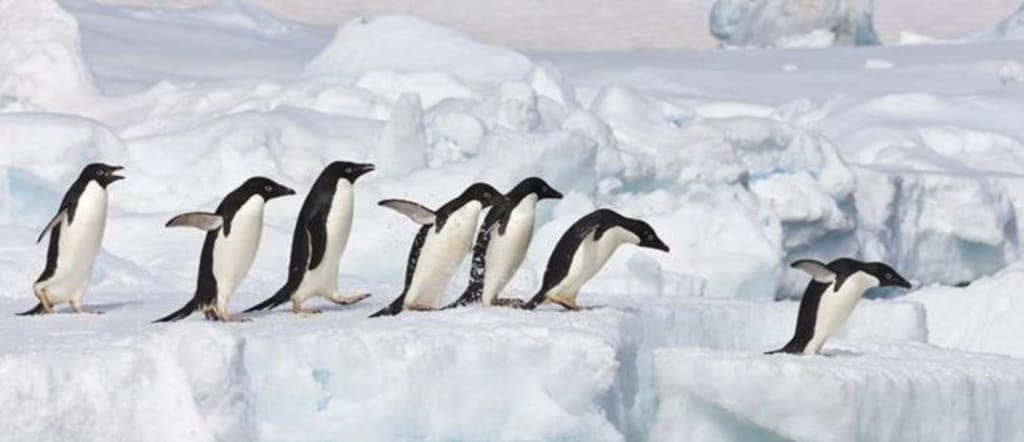Penguins are going extinct! After 80 years, Antarctic precipitation has increased by 2.4 times, and penguins will have nowhere to escape
After 80 years, Antarctic precipitation has increased by 2.4 times, and penguins will have nowhere to escape

Polar bears and penguins can be said to be endemic species at the two poles of the earth. One lives in the North Pole and the other in the South Pole. It looks like two parallel lines, and there is no possibility of meeting each other forever.
Some time ago, it was reported that by the end of this century, polar bears may become extinct due to the continued deterioration of the Arctic environment. In a recent study, scientists found that the fate of penguins is not optimistic. With the increase in Antarctic precipitation, the future will also change. More and more penguins will freeze to death in the wet, cold weather.
Antarctic precipitation to increase by 240% in 80 years
According to reports, by the end of this century, the precipitation in Antarctica will increase by 240%, which also means that Antarctica, which was originally cold and dry in the future, will become wet. It is raining on a large scale, and if the wind blows again at this time, it will be the end for the penguins.
In particular, many young penguins have not yet fully developed, and their feathers are not waterproof. Naturally, they will die in large numbers in such weather.
Scientists from the Sorbonne University in France said that the current forecast for Antarctic precipitation is actually a relatively conservative estimate, and it is possible that in 80 years, the situation will become more serious.
Even in the future, Antarctica may no longer snow, but will gradually desertify after large-scale rainfall. This also means that not only penguins, but other living inhabitants of Antarctica will also be in the next 80 years. , ushered in the test of survival, which is bound to trigger a new round of "survival of the fittest".
The researchers said that the reason for making such a terrible judgment is that such phenomena have already occurred in Antarctica as early as 2013-2014.
At that time, a large number of penguins living in southeastern Antarctica died due to the large-scale heavy rainfall in Antarctica, many of which were young penguins.
In addition, in addition to the frequent precipitation in the Antarctic in the future, the Antarctic will also face large-scale melting of glaciers, which is caused by the greenhouse effect. Last year, Antarctica had the hottest weather record in history, with the temperature soaring exceeding 20 Celsius, and in the future, this high temperature record may soon be broken.
What if Antarctica all melted?
As early as a few years ago, scientists issued an early warning, saying that if humans let the greenhouse effect continue, then in about 400 years, the global sea level may rise by 67 meters. What is this concept? It's as high as a 20-story building.
Naturally, the earth at that time will no longer be suitable for human survival. If human beings are still unable to carry out space migration, they can only wait for extinction on the earth.
The researchers said that if the Antarctic ice and snow all melted, more than 24 million cubic kilometers of liquid water would be produced, and when this water was injected into the ocean, it would cause the sea level to rise by about 67 meters. Of course, if the Antarctic melted all, it also means that Glaciers elsewhere on the planet will also completely melt.
At that time, a large amount of land on the entire earth will be submerged, and many densely populated areas where people live today will be completely transformed into "underwater cities" at that time.
Is there any way for humans to prevent this from happening? The answer is that although it is difficult, there is still a chance. After all, the critical point of the earth has not been completely broken. We only need to strive to achieve global "carbon neutrality" by the end of this century, and to replace traditional energy with new energy as soon as possible. That's it.
What is "carbon neutral"?
To put it simply, through some methods, the greenhouse gases (mainly carbon dioxide) produced by humans can be directly offset, so that the earth's atmosphere will not continue to produce excessive greenhouse gases, and the earth's climate can be reduced. The environment will not continue to deteriorate, and it will buy precious time for human beings to restore the health of the earth.
We all know that the emergence of the greenhouse effect is related to human activities, because humans produce too much carbon dioxide, and the current forest plants on the earth cannot absorb all the carbon dioxide produced by humans. More and more carbon dioxide builds up in the atmosphere until Earth's climate breaks a tipping point.
At this stage, there are three main ways to achieve "carbon neutrality": energy conservation and emission reduction, afforestation and vigorous development of new energy sources. As early as last year, many countries stated that they would realize the popularization of new energy vehicles around 2050, and vehicles that burn traditional resources such as gasoline and diesel will not be able to continue on the road in the future.
In this way, in terms of human transportation, a lot of greenhouse gas emissions can be reduced. In addition, if nuclear fusion energy can be popularized in the next 50 years, this new type of non-polluting green resources will also allow human beings to once again have the possibility of Let's work together for a sustainable tomorrow!
About the Creator
dardani lennon
The question mark is the key to any science
Enjoyed the story? Support the Creator.
Subscribe for free to receive all their stories in your feed. You could also pledge your support or give them a one-off tip, letting them know you appreciate their work.






Comments
There are no comments for this story
Be the first to respond and start the conversation.